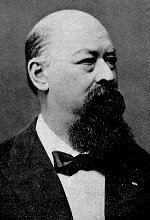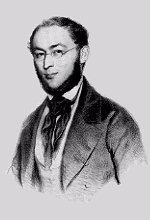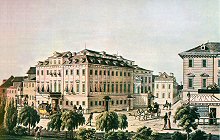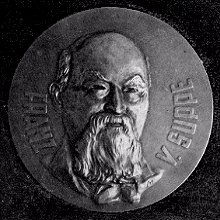| [naar
inhoudsoverzicht muziekgeschiedenis]
[naar
inhoudsoverzicht korte biografieen]
[terug naar inhoud
Suppe-biografie]
[naar
literatuurlijst]
inhoud:
|
BIOGRAPHY first part (1819-1860)

Origin, childhood and youth
Franz von Suppé (Francesco Ezechiele Ermenegildo Cavaliere Suppé
Demelli) was born on April 18th 1819 in Spalato (Split) in Dalmatia.
His ancestors came from Belgium. He grew up in Zara, the capital of Dalmatia.
Already with eight, he started to sing in the choir of the cathedral and
the conductor of the cathedral Giovanni Cigalla initiated him into the
basic knowledge of musical practice. The bandmaster Giuseppe Ferrari
gave
Suppé flute lessons. This instrument should remain his favorite
one. The two musicians taught him also the basic rules of composition and
Suppé began soon to write little compositions.
With fifteen, he was sent to the school of law of the University
of Padova, because he should enter upon the civil service career like his
father. But he was interested above all in music here too. In Milan, that
he visited often, he became acquainted with the contemporary opera productions
at the Scala and he met Rossini, Donizetti and the young Verdi.
With sixteen, the young Suppé finished his first major
work, a Mass in F major. Forty years later, he published it as „Missa
dalmatica".
After the death of the father (in January 1835), Franz and his
mother left Zara in September 1835, moved to Vienna and went to
live with the father of the mother, who lived in the 4th district.
In Vienna, Suppé began medical studies, but he stopped
them soon in favor of the career as musician. He became student under the
musicologist Simon Sechter (1788-1867) and the composer and conductor
Ignaz
Ritter von Seyfried (1776-1841), who has been Beethoven's friend. He
paid for his studies also in giving Italian lessons.
Already one year after his arrival in Vienna, Suppé had
finished a major composition, another Mass (on August 15th 1836), and tackled
then an opera. A year later, on August 15th 1837, he finished the
opera Virginia (adapted from a text by Ludwig Holt), which was never
performed however.
After having finished his studies, Suppé found soon a post
as conductor at the Theater in der Josefstadt.
The Theater in der Josefstadt
The still existing theater was founded by Karl Mayer in 1788. The
usual repertoire of a suburb theater was produced here, but occasionally
works by Schiller were also performed besides farces and Singspiels. Mayer
and his successor Joseph Huber tried to profit to the highest degree from
the enterprise. As the project failed more and more, Huber sold the theater
to Wolfgang Reischl, who commissioned the well-known architect Josef Kornhäusel
(1782-1860) to rebuild and enlarge it. Reischl leased the imperial privilege
to manage a theater, prescribed since Josef II, to the poet Karl Friedrich
Hensler. Fot the ceremonial reopening on October 3rd 1822, Ludwig
van Beethoven composed the overture "Die Weihe des Hauses."
Hensler deceased three years after the takeover and the theater was leased
anew. After 1837, the stage went through a particular glorious days under
Franz
Pokorny.
Pokorny, born in Bohemia, has been first clarinetist at the orchestra
of the Theater in der Josefstadt in the twenties of the 19th century. In
1827,
he moved to Preßburg (Bratislava/Slovakia), where he became conductor
and finally musical director of the theater there. In
1837, he took
over the management of the totally mismanaged Theater in der Josefstadt.
Under his management, the repertoire was wide-ranging, on the program were
among other plays Singspiels, farces and burlesques as well as operas seria
and comic operas. Due to the great repertoire, several conductors were
engaged, which had not only to conduct the orchestra, but also to compose
themselves music for the different plays. Pokorny continue to manage the
theater in Bratislava, furthermore a theater in Baden and one in Ödenburg,
today Sopron (Hungary). In 1840, two conductors left the theater
and Pokorny engaged the young Franz von Suppé.
Conductor at the Theater in der Josefstadt, in Bratislava and Sopron

In autumn 1840, Suppé started to work as conductor at
the Theater in der Josefstadt. He was the less experienced of the four
conductors. Karl Binder and Emil Titl worked since 1837
for Pokorny, Friedrich Witt was engaged at the same time as Suppé.
In accordance with the contract, Suppé had to conduct also performances
at other stages, but at the beginning he was only in charge of the orchestral
rehearsals. In winter 1840, he began to compose the stage music
for C. Wallis' farce „Jung lustig, im Alter traurig oder: die Folgen
der Erziehung", which was performed for the first time on March
5th 1841 at the Theater in der Josefstadt. The critics reacted quite
friendly, applauded Suppé's musical talent, but criticized that
the music had almost nothing to do with the play - as a matter of fact,
the young „Italian" did often not understand the text written in Viennese
dialect and took a chance on setting it to music.
Suppé did not finish the opera „Gertrude della Valle",
he had begun during the next winter. From July 1841 on, Suppé
stayed mainly in Bratislava. Now, he conducted himself performances there
and in Sopron, where guest performances of the theater of Bratislava were
regularly staged.
Marriage and professional success
On October 13th 1841, he married Therese Merville in Vienna.
They had three children a son named Peter Dominik and two daughters,
Therese and Anna. Suppé's wife died in May 1865.
In the last years before her death, the couple lived apart. Suppé's
second wife, Sophie Strasser, came from Regensburg. She got to Vienna
in autumn 1865 to study voice and she asked Suppé for examining
her voice. He procured her a place in the choir of the Carltheater.
On
July
18th 1866, Suppé married Sophie Strasser at the parish church
of Lainz.
Till 1845, Suppé composed the stage music for about
twenty plays - vaudevilles, farces and spectaculars, which were performed
at the different theaters of director Pokorny. Particularly successful
was a work by the dramatic poet Franz Xaver Told: his magic play
„Der
Zauberschleier oder: Maler, Fee und Wirtin" enjoyed great popularity
a long time after its première on February 11th 1842. At
first, it had a run of 100 performances and then another 240 within the
next three years.
Suppé was not only successful as conductor and composer
- on May 2nd 1842, he made his debut as singer in Bratislava playing
the part of Dulcamara in Donizetti's „l'Elisir d'Amore". When Pokorny
retired from the theater in Bratislava, Suppé returned to Vienna
in April 1844. At first, he conducted only at the Theater in der
Josefstadt. The repertoire covered besides the usual farces and vaudevilles
also more demanding works such as Gaetano Donizetti's „Maria, die Tochter
des Regiments" or Gioacchino Rossini's „Othello".
At this time, Suppé lived in the Josephstadt. His son Peter
Dominik (1844-1894) was born on October 16th 1844. Despite his
musical talent, Peter von Suppé did not take up later the
profession of musician, but he became - at his father's request - officer
at an Austrian bank.
In 1845, Franz Pokorny, whose successes at the Theater
in der Josefstadt had made him a well-off man, bought the ruined Theater
an der Wien. Now, the twenty-six-year-old Suppé had a new field
of activity at this house and he left the theater in the Josefstadt.
The Theater an der Wien

The Theater an der Wien
The theater was inaugurated by Emanuel Schikaneder (1751-1812)
in 1799. The clever impresario Schikaneder put here not only folk
plays and dramas on the stage, but also operas. Occasionally, he took himself
part as stage manager or even as actor, as in the performance of Mozart`s„Zauberflöte"
(1791)
at the Theater auf der Wieden.
There were again and again memorable performances at this theater -
Beethovens
first version of „Fidelio" („Leonore") was performed for the first
time at this house in 1805.
Till the opening of the opera house of Vienna in 1869 it was
considered to be Vienna's most beautiful and magnificent theater. In 1826,
the smart actor Carl Carl (pseudonym of Karl von Bernbrunn, 1787-1854,
born in Krakow) took over the house and switched the repertoire totally
to popular plays. With his programs he achieved for a long time great financial
success. It was a lucky strike for him to engage Johann Nestroy, whose
plays enjoyed great popularity with the Viennese public. In 1838,
Carl put his fortune into being up for sale theater of Leopoldstadt. From
that time on, he took a particular interest in his new purchase at the
second district. He neglected more and more the Theater an der Wien - after
drastic financial losses it had to be auctioned off in April 1845.
Franz Pokorny acquired it. After an expensive renovation the house was
inaugurated on August 39th 1845.
Suppé at the Theater an der Wien

The young conductor „moved" to the Theater an der Wien and occupied
there a two-room company flat. His first commission for the new theater
consisted in composing a festive overture for the ceremonial reopening.
After the overture, Friedrich von Flotow's (1812-1883) opera „Alessandro
Stradella" was performed for the first time in Vienna.
Franz Pokorny wanted to program more operas, because he wanted
to convert his new theater into a formidable rival of the Kärtnertortheater.
He augmented the stage ensemble and engaged qualified singers.
Between 1845 and 1847, no less than 36 operas were
in rehearse, but the manager of the theater Pokorny had to realize soon
that the costly opera productions would ruin the theater. He was finally
compelled to play a more popular repertoire.
In this time, Suppé continued to compose stage music, such
as „Die Gänsehüterin oder: Hans und Gretchen" adapted
from a text by G. Ball. The première was performed on February
11th 1846 at the Theater an der Wien.
Director Franz Pokorny died in August 1850. Dismayed
at the unexpected death of his patron, Suppé began to compose a
requiem. Five years later, on November 22nd 1855, it was performed
at the church Maria Treu in the Josefstadt.
Pokorny's twenty-five-year-old son Alois took over the
management of the theater. The Viennese public knew him already as stage
manager. The bad financial situation of the theater required stringent
economy measures. Pokorny adhered, contrary to his father, to a fixed program.
In the meantime, Suppé separated from his wife. He spent
a part of his leisure time with the members of the artists' association
„Die grüne Insel", to which he was admitted in March 1856.„Die
grüne Insel" was an association of creative and interpretative
artists, which was founded in 1855 at a wine tavern of the Heiligenkreuzerhof.
It had no political character, but stood up for social amelioration for
musicians and actors - it demanded from public institutions for instance
pensions and donations to cover artists financially.
The open-air stage in Vienna-Fünfhaus
In autumn 1848, the producer Pokorny worked out the ambitious plan
to build a summer theater. He constructed a large wooden open-air theater
with three galleries holding 3,500 spectators in the park of the noble
family Pereira-Arnstein at the Braunhirschengrund (Fünfhaus, near
today's Schönbrunnerstraße). On July 1st 1849, it was
inaugurated with the farce „Gervinus, der Narr von Untersberg" and
Suppé's stage music. During twelve summers plays were performed
at the Theater am Braunhirschengrund. But dwindling numbers of spectators
turned it slowly into a financial burden and led finally to its closure.
The overture to „Dichter und Bauer"
In the season 1846/47, his greatest success was the overture to
the comedy „Dichter und Bauer" by Karl Elmar, which was performed
for the first time on August 24th 1846. Suppé's overture
has been performed without success already earlier. At that time, Pokorny
demanded that Suppé had to rewrite the play, only after that he
would think of another performance. But finally, the original version was
performed after all - and received with enthusiasm. Shortly after, Suppé
found also a publisher. He sold Josef Aibl of Munich the copyright
of the work for the unimportant amount of five guldens. The publisher was
lucky: Over fifty arrangements of the piece were published between 1846
and 1850 alone.
„Das Mädchen vom Lande"
Besides the time-consuming activity as conductor and composer of stage
music, Suppé had still time for composing an opera. „Das Mädchen
vom Lande", adapted from a text by Karl Elmar, was performed
for the first time on August 7th 1847.
The story of the opera: The poor young composer Violanti
lives in Naples. He loves a beautiful girl coming from the country named
Teresa,
who is in reality a famous singer and stays incognito in the town for a
while. Violanti has composed an opera. Erminia, a rich patron, pleads for
the performance of the work, but her jealous fiancé Luigi Vulcani
tries to forestall the performance with the aid of the stage manager and
the secretary of the theater. Battista, the smart servant of the composer,
succeeds in thwarting Vulcani's plans. But the prima donna falls ill shortly
before the première. Thereupon, Teresa plays her part and reveals
so the secret of her identity. After a few performances, the opera was
taken off the programs of the Viennese theaters. But Italian theater companies
adopted it and continued to perform it under the title „L'intrigo teatrale".
The song „Das is' mei' Österreich"
On November 13th 1849, the Romantic fairy tale „'s Alraunl"
was performed for the first time. Anton von Klesheim (1812-1884)
wrote the text and Suppé composed the music. The central character
of the play, the Röserl, had to sing a song with the refrain „Das
is' mei' Österreich, das is' mei' Vaterland". Both the song and
the singer had not the desired success, so the aria was struck out without
substitution. A few years later, the actor Karl Treumann put a new, funny
text to the song and the song became extraordinarily popular before long
- at first with the new text, later also with the original text. It ranked
with Suppé's most known works for a long time.
The opera „Paragraph 3"
In 1857, Suppé started to set to music an important work
again. The première of the opera „Paragraph 3" was not performed
at his parent theater, but at the imperial and royal court opera theater
at Kärntnerring on January 8th 1858.
The story: A young girl is to inherit a great fortune,
provided that she complies with the condition specified under paragraph
3 of the last will and testament in getting married. As she loves a young
man and he loves her too, that poses not a great problem for her. But her
guardian is suppressing the will to gain possession of the inheritance.
A painter finds the „lost" document and there is nothing to prevent the
bliss of the young couple.
The new work was not successful. The critics, especially Eduard
Hanslick, provided it with withering reviews. After just three performances,
the opera was taken of the program of the court theater.
The birth of the German operetta - „Das Pensionat"
In autumn 1858, The Carltheater in Vienna presented for the first
time the new plays by Jacques Offenbach. The German by birth had
already great successes with his operettas at Parisian theaters. Therefore,
Suppé composed now also a work of this genre: „Das Pensionat" was
performed on November 24th 1860 at the Theater an der Wien and wnr
down in history of music as the first German operetta.
Suppé's newest composition after an anonymous text (the
librettist hid himself under „C. K.") appealed to both the Viennese public
and the critics. Even Eduard Hanslick expressed an positive opinion
about the operetta. He wrote in the press dated November 25th 1860:
„The libretto, probably copied on the French model, is simple,
it does not lack the funny matter and is done up with many allusions and
quite a few witty remarks moreover. The music is distinguished by a great
variety of melodies, is very simple and will soon become popular. In the
near future, we will probably not lack „Pensionat" waltzes and quadrilles."
The story: Helene lives in a girls' boarding school, run
by the headmistress Brigitta. Helene loves Karl, who asks her parents for
her hand in marriage. At first, they turn down, but they promise to give
him their daughter in marriage, if he finds a job within 48 hours. During
Brigitta's absence, Karl steals in the boarding school and pours out his
troubles to his love. Helene finds immediately a way out, because the post
of manager of the boarding school is vacant, and works out a plan. Through
false assertions of love, Karl puts Brigitta, who feels attracted to him,
in an awkward situation. Helene calls the other girls and Brigitta can
only save herself from the compromising situation in appointing Karl as
manager.
The play was very successful and was put on several new productions.
Suppé composed several new interludes for these new productions.
The example: Jacques Offenbach's plays
Jacques (Initially Jakob) Offenbach was born on June 20th
1819 in Cologne. His father Isaac Juda Eberst (called „Offenbacher",
because he came from Offenbach am Main) took him and his brother to Paris
for studies. Offenbach studied violoncello for a year at the Conservatoire,
left it at the age of fifteen and kept above water as cellist in different
orchestras. In 1838, he met Fromental Halévy (1799-1862),
who imparted the compositional foundations to him. With varying success,
Offenbach tried his skill as interpreter of own waltzes, romances and salon
works. The final breakthrough came only in 1855 with the world's
fair in Paris. He rented with friends a theater at the Champs-Elysées
and opened there the Bouffes Parisiens on July 5th 1855. At first,
he had got a privilege to play with three actors - at the most three actors
were permitted to be on the stage at the same time - and he composed now
for these conditions comic one-act plays. In no time, this new musical
genre caused quite a stir. The Parisian public went in crowds to the performances.
Already the next winter, the troupe could move to a more spacious theater.
In the course of the next years, the composer wrote about sixty plays,
which he staged in parts expensively. As a result, the theater got into
difficulties despite great financial successes and Offenbach had to flee
from the bailiffs to Brussels.
In the meantime, he had received a full privilege, i. e. an unlimited
number of actors and singers were allowed to act on the stage at the same
time. In 1858, he put on the stage the „Ópera bouffon" „Orpheus
in der Unterwelt" and provoked with it a storm of controversies among
the Parisian reviewers. This enhanced the success of the play even more
- it had a run of 228 consecutive performances. Theaters in all parts of
Europe took over Offenbach's works. In Vienna, Karl Treumann was
first to see the possibility to make capital out of this success. He had
heard Offenbach's pieces at the Bouffes Parisiens and was able to convince
the director of the Carltheater, Johann Nestroy, to put them on the stage.
Treumann paid no attention to the clarification of the copyrights, ordered
the new instrumentation of the piano scores, he brought from Paris, and
the translation of the text into German. The one-act plays were very successful
from the start. Since the success continued, Treumann decided to propose
a settlement for the unauthorized use of his works to Offenbach, who accepted
indeed. When Johann Nestroy retired from theater life in 1860, Treumann
seized the opportunity and opened his own theater. Now he invited Offenbach
to present himself his newest works in Vienna at his Theater am Franz-Josefs-Kai.
 |